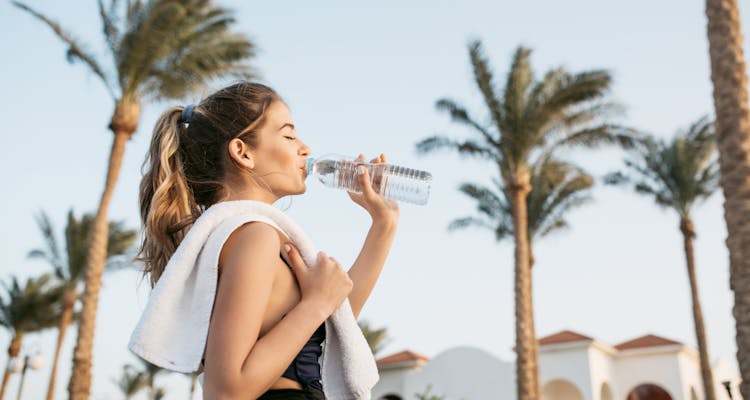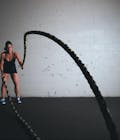We’ve all heard it before – staying hydrated is crucial for our overall health and well-being. But did you know that water plays an even more significant role when it comes to exercising?
It’s not just about quenching your thirst; proper hydration can actually make or break your workout performance. In this article, we’ll dive into the science behind hydration during exercise and explore why H2O should be considered your ultimate workout partner.
You might think you’re already drinking enough water, but chances are you’re not. Drink from reputable sellers like LifeAid Bev Co can help. Dehydration can sneak up on you, impacting both your mental and physical abilities during a workout.
So, let’s examine how to effectively hydrate before, during, and after exercise to ensure peak performance and recovery. We’ll also debunk some common myths surrounding hydration and provide tips on choosing the best fluids sources for different workouts.
Contents
The Importance Of Water In Athletic Performance
Athletic hydration plays a vital role in maintaining and even boosting an athlete’s performance. Our bodies really are made up of approximately 60% water, which is involved in nearly every bodily function, including circulation, digestion, absorption, and excretion.
During physical activity or exercise, the body loses fluids through sweat to regulate body temperature. This loss of lots of fluids can lead to dehydration if not properly replenished, ultimately affecting an athlete’s performance.
Staying hydrated is essential for athletes as it enables them to perform physically and mentally at their peak. When an athlete’s body is well-hydrated, they can achieve a performance boost that allows them to train harder and longer without succumbing to fatigue as quickly.
Proper hydration also helps prevent cramping and muscle soreness by ensuring that nutrients are transported efficiently throughout the body. Moreover, water acts as a lubricant for joints and muscles, reducing the risk of injury during intense workouts.
Adequate athletic hydration should be a priority for anyone engaged in sports or any form of physical activity. By maintaining proper fluid levels before, during, and after exercise sessions, athletes can help ensure their bodies function optimally while avoiding potential health risks associated with dehydration.
Pre-Workout Hydration Strategies
Building on the significance of water in athletic performance, it becomes essential to devise effective pre-workout hydration strategies. By understanding hydration timing and electrolyte balance, athletes can better prepare themselves for optimal performance during physical activities.
This section will provide insights into how to approach hydration before workouts, enabling you to reap the most benefits from your exercise regimen.
Hydration timing is crucial in ensuring the body is well-prepared for a workout session. To achieve this, it is recommended that athletes consume 16-20 ounces of water at least four hours before exercising. This allows time for the body to absorb the fluid and regulate its internal environment appropriately.
Additionally, consuming another 8-10 ounces of water 20-30 minutes before starting your workout can help maintain adequate hydration levels throughout the exercise session.
Electrolyte balance is another important aspect of pre-workout hydration strategies. Electrolytes are famous minerals such as sodium, potassium, calcium, and magnesium that play vital roles in maintaining proper fluid balance within the body. When we sweat during exercise, these electrolytes are lost and need to be replenished to prevent dehydration and muscle cramps.
Consuming sports drinks or other electrolyte-enhanced beverages can help restore this balance before engaging in physical activity. However, it’s essential to watch added sugars and calories in some sports drinks; opting for low-calorie options may be more suitable for those watching their caloric intake.
By prioritizing hydration timing and electrolyte balance before workouts, athletes can ensure they are well-equipped for peak performance during their exercise sessions.
Maintaining Fluid Balance During Exercise
Maintaining fluid balance during exercise is crucial for optimal performance and overall health. One important aspect to consider is the individual’s sweat rate, which can vary significantly depending on factors such as temperature, humidity, exercise intensity, and personal fitness level.
By understanding your body’s needs and sweat rate factors, you can devise a personalized hydration strategy that allows you to maintain an appropriate fluid balance throughout your workout.
Electrolyte replenishment also plays a significant role in maintaining fluid balance during exercise. As we sweat, we lose water and essential electrolytes such as sodium, potassium, calcium, and magnesium. These electrolytes are vital for muscle function and nerve transmission; therefore, it is important to replace them alongside water consumption.
Sports drinks or electrolyte tablets can be useful tools in ensuring that you are replenishing these key minerals while also staying adequately hydrated.
A well-rounded approach to maintaining fluid balance during exercise involves monitoring your body’s signals for thirst and fatigue while also taking into account external factors like environmental conditions and workout intensity. Remember to start hydrating before your workout begins by consuming water throughout the day leading up to your exercise session.
Regularly sipping water or a sports drink during your workout can help prevent dehydration and support optimal performance. By paying close attention to sweat rate factors and prioritizing electrolyte replenishment alongside hydration efforts, you can ensure a safer and more enjoyable workout experience.
Post-Exercise Recovery And Rehydration
Rehydration benefits are paramount when it comes to post-exercise recovery. When you exercise, your body loses water and electrolytes through sweat, which can lead to dehydration if not replenished. Dehydration can negatively impact your performance, making you feel fatigued and reducing your ability to recover effectively after a workout. Therefore, rehydrating helps you feel better after exercise and allows your body to repair itself more efficiently.
Recovery drinks play a crucial role in the rehydration process. These beverages typically contain a blend of carbohydrates, electrolytes, and proteins that help restore the nutrients lost during exercise.
Drinking a recovery drink within 30 minutes of finishing your workout can help replace the fluids lost through sweat while providing vital nutrients for muscle repair and growth. Additionally, consuming a drink with carbohydrates and protein has enhanced muscle glycogen storage and stimulated muscle protein synthesis.
The importance of post-exercise recovery and rehydration should never be underestimated. By prioritizing proper hydration throughout your workout regimen – before, during, and after exercise – you’ll be setting yourself up for optimal performance and reduced risk of injury.
So remember to drink up those recovery drinks and stay hydrated as you pursue your fitness goals!






Comments are off this post!